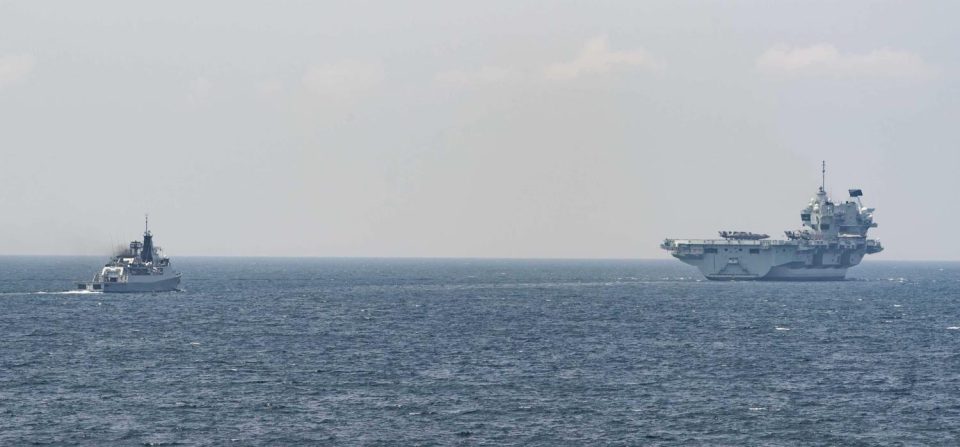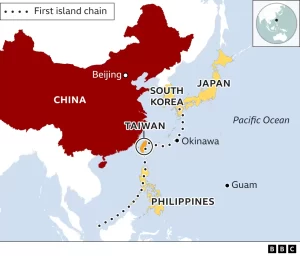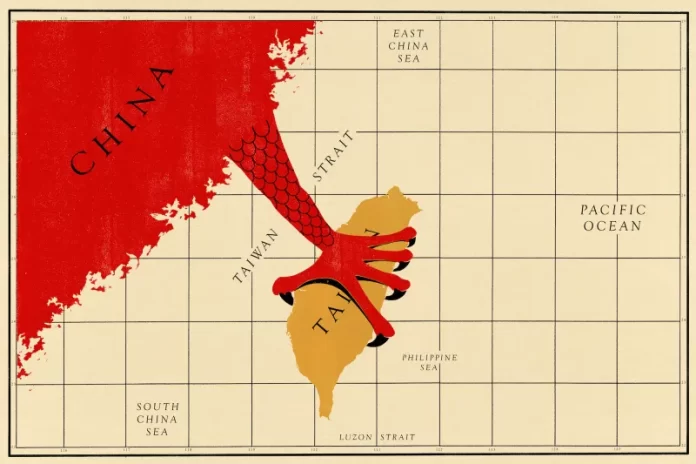|
Getting your Trinity Audio player ready...
|
There’s been no shortage of coverage on the rising tensions between the United States and China over Taiwan over the past few months and make no mistake, the conflict of interests in the region is likely going to reach a boiling point. But what exactly is going on? In the midst of these rising tensions, there is a lot of finger pointing and military flexing for a small island that fancies itself an independent country despite never officially declaring itself one. With billions in humanitarian and military aid being dedicated to Ukraine in its fight against Russia, it’s not hard to imagine that many Americans are loath to get involved in another conflict with a major power in a different part of the world. However, the stakes for the US in the Pacific are vastly different than in Ukraine and if the brewing storm clouds start to thunder, it is in America’s best interest to be ready to rumble.

Taiwan
Taiwan is the prize everyone is fighting for. The Taiwan Strait separating it from mainland China is 70 miles at its narrowest point, shorter than the distance between Miami and Havana. Just this past week saw four instances in which Chinese aircraft entered Taiwanese airspace and the increased frequency of military exercises involving naval and amphibious warfare tells US officials everything they need to know about where China’s focus is at. What makes Taiwan such a catch? As it turns out, the answer is political, economic, and strategic in the short term and long term for both sides.
First is the Taiwan Semiconductor Manufacturing Company, or TSMC for short. It is the largest producer of the most advanced semiconductors in the world. The average American might know them as microchips. They are in our IPhones, GPS and TV’s and cover the processing power for Artificial Intelligence and military equipment from missiles to planes to tanks.
Needless to say, these tiny chips run the global economy. Taiwan’s ban on exporting microchips to Russia amidst their conflict in Ukraine has caused such a heavy shortage of advanced military equipment, they are beginning to fall back on weapons dating as far back as the 1960’s. Japan and South Korea are also fairly competitive producers of microchips but the cold hard truth is, even those countries are behind the curve when stacked up against Taiwan’s cream of the crop.

Taiwan has always been China’s end goal when it came to scoring political points on the international stage. For decades, they have claimed Taiwan as part of China but the US’ hold on the region has prevented them from realizing this goal. Now that they’ve accomplished a complete modernization of their military, China is becoming bolder in its stance against the island which is precisely what’s caused all this tension to wind up. If they triumph, they would prove to the world that it can succeed in defeating the United States and effectively kick us out of the region. Certainly not a good look for America and it will make protecting our interests elsewhere more difficult now that China can stand on equal footing with the US.

However, should the US succeed, China will be set back decades and with a reestablished hold on the Pacific, America would be in a position to blockade China at any moment from Japan to the Philippines and Indonesia. In fact, just a few months ago, the US revoked China’s ability to import much of the most crucial technology such as microchips from Taiwan, the US, or its allies which is already having effects on the Chinese economy. It could be said that such a move would push a cornered China into acting sooner rather than later, in the same way America’s oil ban on Japan during World War II prompted them to begin plans for Pearl Harbor, but the alternative doesn’t change the path China intends to walk. It merely prolongs it, giving them more time to prepare.
China
If you thought the US and Taiwan were the only countries China was butting heads with, you’d be quite wrong. In fact, China has disputes with virtually all of its neighbors including Japan, Vietnam, Laos, Malaysia, the Philippines, India, Bhutan, and Mongolia. Some of these disputes, particularly its disputes with India have devolved into armed conflict in the past. So let’s break down the most significant of China’s claims: the South China Sea.

The South China Sea is the body of water that sits between China to the north, Vietnam to the west, the Phillipines to the east, and Malaysia to the south. It is home to quite a few oil reserves that leaves the area hotly contested by all the countries nearby. The official international solution was to split the oil reserves between each country hoping to stake a claim on them. Just about everyone agreed except China, the farthest country geographically to the oil reserves in question. Their solution was called the “9-Dash Line,” and it posited the South China Sea as entirely Chinese territory. Everyone else is understandably irritated by the move and it’s created a hotbed for tensions for years now.

So, for all the finger pointing and accusations being thrown about on the international stage, it can be said with fair confidence that the current issue China and the US is having over Taiwan is not an isolated event. It is the latest in a series of behavioral patterns from an authoritarian country seeking to upset the current American led global order. If you want a glimpse of what happens when China succeeds in forcibly taking over a previously independent country or autonomous province, look no further than Hong Kong and the brutal suppression of its citizens. If you want to go back even further, you can look at Tibet, whose country was annexed by Mao Zedong, then leader of China, and led to countless human rights abuses. Both Tibetans and citizens of Hong Kong are very closely tied to China ethnically. What about those who aren’t, such as Uyghur Muslims?
Given the disastrous leakage of video footage showing Uyghur Muslims being ordered into train carts and ferried off to undisclosed locations, I would say the outlook is not very good. Many countries around the world are understandably wary about China and their track record provides plenty of reason to be skeptical of Xi Jinping’s motives.

So What Comes Next?
The United States is in quite a precarious position in the Pacific. If there is anything good to be learned from this, it is that the US has no shortage of allies in the region. As mentioned previously, China’s squabbles with its neighbors have pushed many of them into the welcome arms of the US. With Joe Biden’s recent visit to Southeast Asia, it communicates perfectly that America plans to intimidate China into backing down. It isn’t a permanent solution, but it will likely kick the can down the road. What is the risk? Well, if some sort of military provocation occurs involving the deaths of soldiers on either side of the conflict, escalation will soon follow and with planes and ships skirting dangerously close to enemy territory and often crossing over in China’s case, the odds that an incident will occur increases. It is not easy to toe the line and during the Cold War, this led to many nuclear scares over the course of the 20th century. The all too familiar Cuban Missile Crisis is chief among them. Will something similar occur with Taiwan?
Only time will tell but whether China and the US face off now or further down the line, a Pacific showdown is inevitable. In the grand scheme of geopolitics, history has shown that dominant powers never stay friends, if they ever were. When the time comes, it is the hope of many Americans that we are ready and if there was ever a time to be thankful for American military investment, it would be now.
Andres Pena is a Pinecrest resident and graduate of New York University with degrees in both English and American Literature and Political Science. He works for Miami’s Community News as both a writer and administrative assistant. For more inquiries on US and Global News, contact andres@communitynewspapers.com or call 305-951-6726.
ABOUT US:
For more Miami community news, look no further than Miami Community Newspapers. This Miami online group of newspapers covers a variety of topics about the local community and beyond. Miami’s Community Newspapers offers daily news, online resources, podcasts and other multimedia content to keep readers informed. With topics ranging from local news to community events, Miami’s Community Newspapers is the ideal source for staying up to date with the latest news and happenings in the area. Additionally, the newspaper has exclusive Miami community podcasts, providing listeners with an in-depth look into Miami’s culture. Whether you’re looking for local Miami news, or podcasts about the community, Miami’s Community Newspapers has you covered.







Comments are closed.